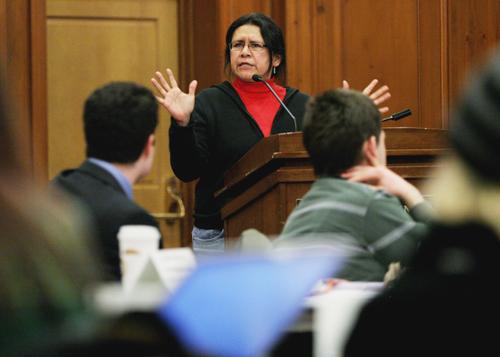American Indian groups protest ISS referendum
Feb 1, 2007
Last updated on May 12, 2016 at 07:32 a.m.
The gallery area of the Pine Lounge in the Illini Union, normally deserted and quiet during Illinois Student Senate meetings, was full and unusually noisy during Thursday’s lengthy session. Members of several minority student groups, as well as representatives of the Native American House, gathered in strong numbers to protest the Senate’s adoption of a resolution supporting the University’s Illini Heritage Program Referendum.
The proposed program, which is supposed to support diversity outreach on campus, create scholarships for American Indian students and increase Native American cultural education, came under fire from many groups because they said American Indian organizations on campus were not consulted during the writing of the referendum. The groups also stated the language used in the document is problematic, and that the measure would set up competing institutions.
Many who spoke cited a historical lack of dialogue between University officials and minority student groups.
“Rarely did the people then and now speak to Native Americans and ask, ‘What do you need? How can we help you?'” said Debbie Reese, professor of American Indian Studies. “There was no input from native peoples for this … Your referendum would look different if you had come to us in the planning stages. We’ve had an experience and a history on this campus of not being talked to, of being dismissed as ‘another anti-Chief group.'”
Get The Daily Illini in your inbox!
Although the controversial Chief Illiniwek was not mentioned anywhere in the resolution or the referendum, he was invoked several times by subsequent speakers as a symbol indicative of the environment that exists on campus, and yet another example of the absence of dialogue perceived by many.
“There’s so much that you don’t know about what you’re trying to do here,” Reese said.
Others seated in the Pine Lounge gallery came to the podium and addressed senators with a similar point of view.
“There is a protocol and a diplomacy and a way of honoring each other as human beings that requires that you come to our community,” said Genevieve Tenoso, graduate student, to the senators. “If you do not have the wherewithal to come to us on a person-to-person level about issues that supposedly concern us, that’s dehumanizing.”
Several senators questioned those who spoke out against the measure, asking for clarification on various points and disputing the relevance of the Chief Illiniwek issue to the resolution under consideration.
“What you don’t condemn, you condone – and that’s why language is very important,” Tenoso said in response to such concerns.
“Our ongoing programs need to be strengthened before we discuss additional programs and institutions,” said Wanda Pillow, director of the Native American House. “This referendum, in its current form, is unacceptable.”
Tensions occasionally ran high as impassioned students and professors addressed the assembled ISS delegates. People in the gallery often shook their heads and discussed these issues amongst themselves. But eventually, all fell silent as the last objections were voiced, and senators stopped asking questions.
Once the public comment portion of the meeting had ended, senators briefly discussed the measure and then quickly voted it down. The gallery’s reaction to the decision was muted; most simply filed out and a few applauded and informally thanked the body.
Frank Calabrese, student senator for LAS and sponsor of the controversial resolution, expressed a willingness to work with American Indian groups and students as he moves forward.
“This was written by a friend of mine, and I really think he had the best of intentions,” he said. “But it doesn’t make any sense to do this without the input of the people involved.”
Other senators also expressed a desire to rectify problems with the referendum and include the groups who opposed it.
Calabrese added that “we need to do this together.”






